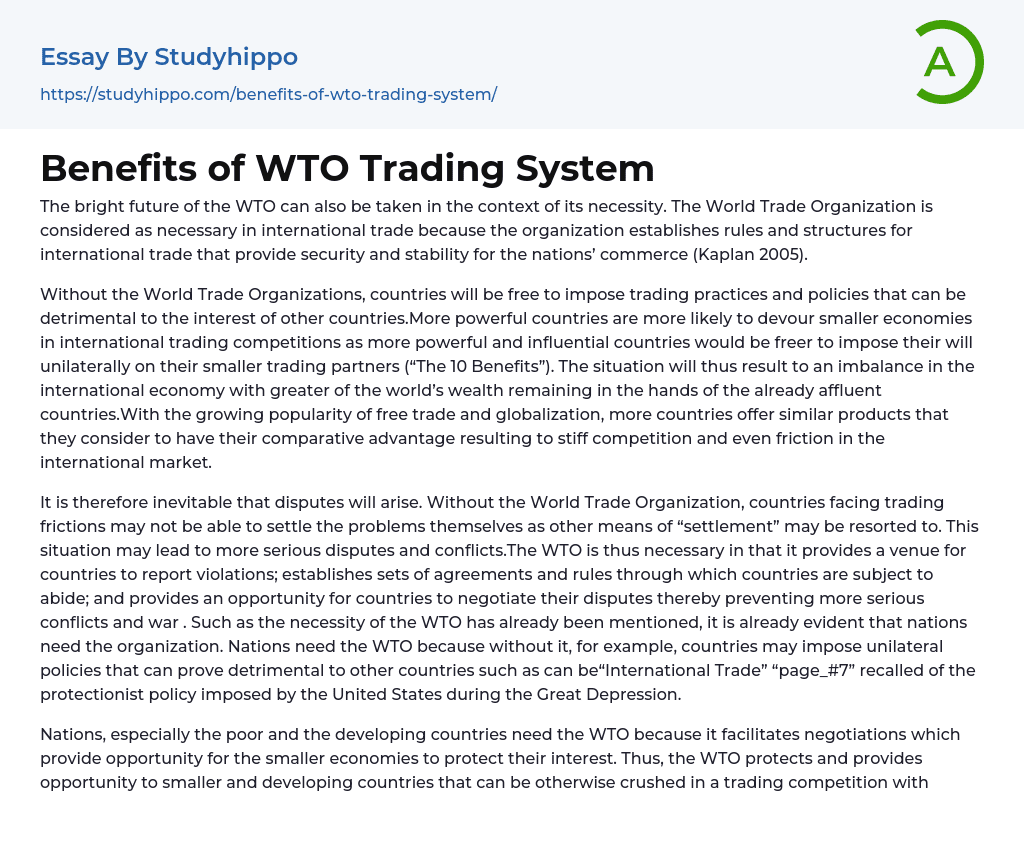The significance of the WTO's future is attributed to its importance in regulating international trade. Its existence guarantees stability and security within the realm of global commerce, as it establishes crucial guidelines and frameworks for nations to follow (Kaplan 2005).
Eliminating the World Trade Organizations would give countries the power to implement trading practices that could negatively affect other nations, potentially leading to larger economies dominating smaller ones in international trade competitions. This could result in an unfair distribution of global wealth, with richer countries holding a greater share. As free trade and globalization continue to grow, many countries are producing similar goods based on their comparative advantages, causing intense competition and potential conflicts in the global market ("The 10 Benefits").
The World Trade Organization (WTO) is necessary to manage and resolve trading disputes between nations
.... In the absence of the WTO, alternative dispute resolution methods may lead to more severe conflicts. The importance of the WTO lies in offering a space for countries to address violations, create agreements and regulations that must be adhered to, and enable negotiations for conflict resolution and war prevention. Countries need WTO involvement to prevent unilateral policies that could negatively affect other nations, such as the United States' protectionist approach during the Great Depression.
The importance of the World Trade Organization (WTO) is its capacity to enable discussions that protect smaller and developing nations' interests. This is essential because it prevents these economies from being overshadowed in a trading competition dominated by powerful countries like Canada, Japan, and the United States. Without the WTO's supervision for equitable treatment, wealthier nations can effortlessly dominate the global market and suppress poorer countries ("Trade
the").
The WTO is essential in protecting and advancing the interests of smaller economies. Through the most favored nation treatment, the organization offers non-discriminatory opportunities to all member states. It has been restructured to cater to the needs of less affluent countries, in addition to bigger players. Furthermore, the WTO empowers lesser and developing economies by providing increased bargaining power to smaller countries.
The importance of the World Trade Organization to nations lies in its ability to prevent and resolve trading disputes between countries, ensuring that smaller nations can compete with powerful and developed countries in the global market without being left behind. The WTO's structure of policies and regulations establishes acceptable norms for international trade among member states, preventing instances where one country may curtail another country's trading rights and opportunities due to lack of policy. Without the WTO, unregulated trading relations could result in serious conflicts, such as political war. By avoiding such conflicts through its policies, the WTO ensures that disputes do not arise, allowing for harmonious international trading.
To sum up, the WTO and the Doha round of international trade are addressed in various points. The WTO symbolizes globalism and a multilateral system, where negotiations on trading, like the Doha round, take place. Developed countries view Doha as a way to enhance worldwide collaboration and advance international trade, potentially resulting in poverty reduction.
While developed countries see the agenda of trade negotiations as necessary for world trade policies, protestors and developing nations argue that it only gives further control to developed nations and worsens trade inequality. Despite this clash of interests and inflexibility among member nations, there is still hope for
consensus and agreements in the Doha rounds, with current trends in globalization contributing to a brighter future for the WTO and international trade. The WTO is crucial in promoting and regulating free trade and globalization, highlighting its significance in the global economy.
References
Benefits of WTO Trading System n. d, World Trade Organization, viewed 8 Dec.
The Meaning of Doha was viewed on December 8, 2001 by Walden Bello and Anuradha Mittal. In 2006, more information about the World Trade Organization can be found at http://www.wto.org/english/thewto_e/whatis_e/10ben_e/10b03_e.htm. The and their contents should remain unchanged.
In 2006, Evan Davis reported on the demise of the WTO's Doha talks in an article published on BBC News. The source for this information can be found at http://www.tradeobservatory.org/headlines.cfm?refID=17056 and was accessed on December 8th of that year.
The year 2006 and a hyperlink to a news article on BBC's website about business are enclosed within a paragraph tag.
- Business Law essays
- Contract essays
- Consumer Protection essays
- Property essays
- Ownership essays
- Agreement essays
- Common Law essays
- Contract Law essays
- Justice essays
- Security essays
- Tort Law essays
- United States Constitution essays
- Crime essays
- Lawsuit essays
- Treaty essays
- Family Law essays
- Marijuana Legalization essays
- Constitution essays
- War on Drugs essays
- Court essays
- Jury essays
- Police essays
- Protection essays
- Community Policing essays
- Criminal Law essays
- Judge essays
- Lawyer essays
- Employment Law essays
- Copyright Infringement essays
- Injustice essays
- Intellectual Property essays
- Breach Of Contract essays
- Jurisprudence essays
- Social Injustice essays
- Juvenile Justice essays
- Internet Privacy essays
- Cyber Security essays
- Bill Of Rights essays
- Civil Liberties essays
- First Amendment To The United States Constitution essays
- Fourth Amendment To The United States Constitution essays
- Second amendment essays
- Animal Cruelty essays
- Law Enforcement essays
- Juvenile Justice System essays
- Surveillance essays
- Forensic Science essays
- Crime Prevention essays
- Criminal Justice essays
- Criminology essays




